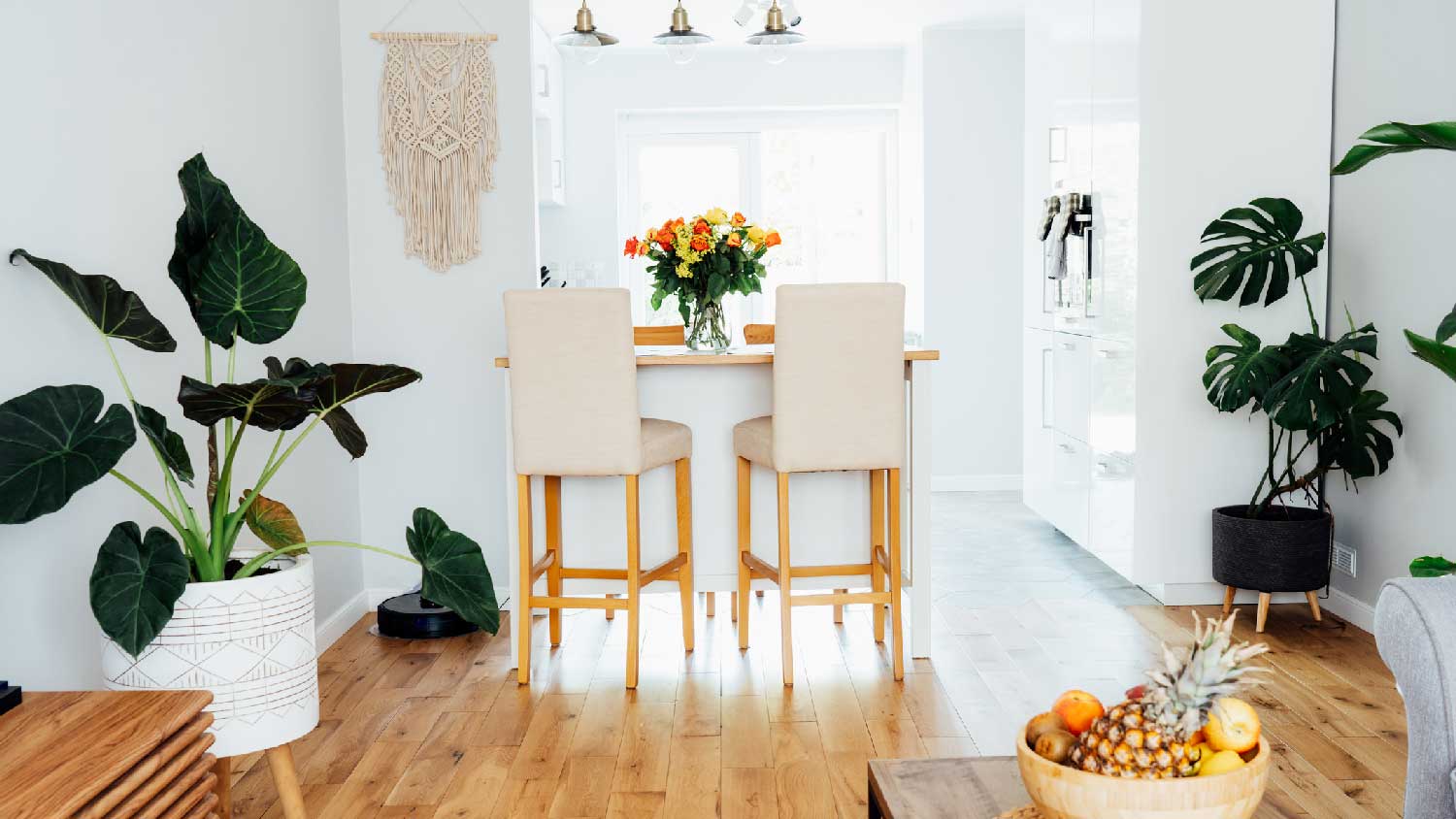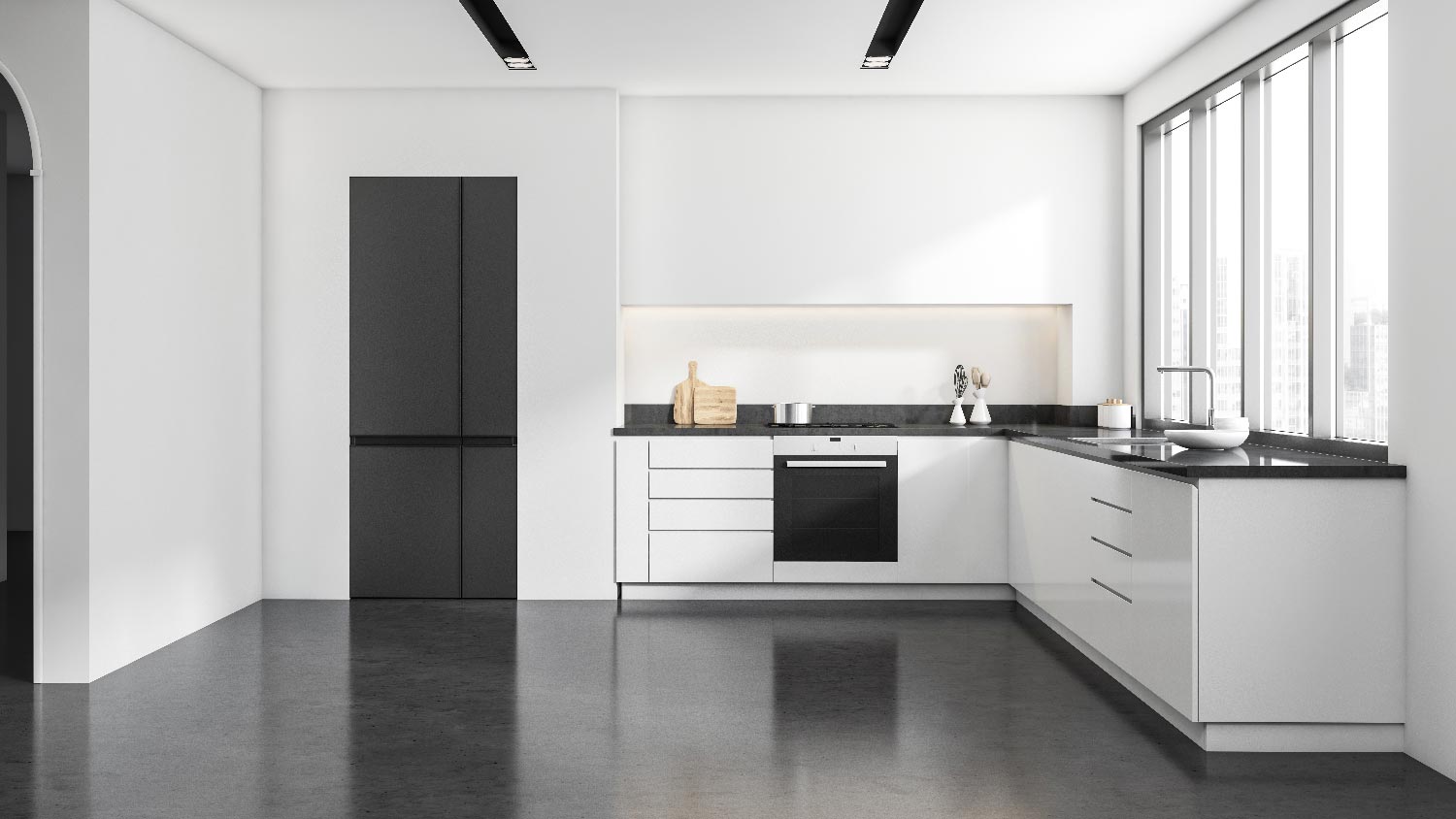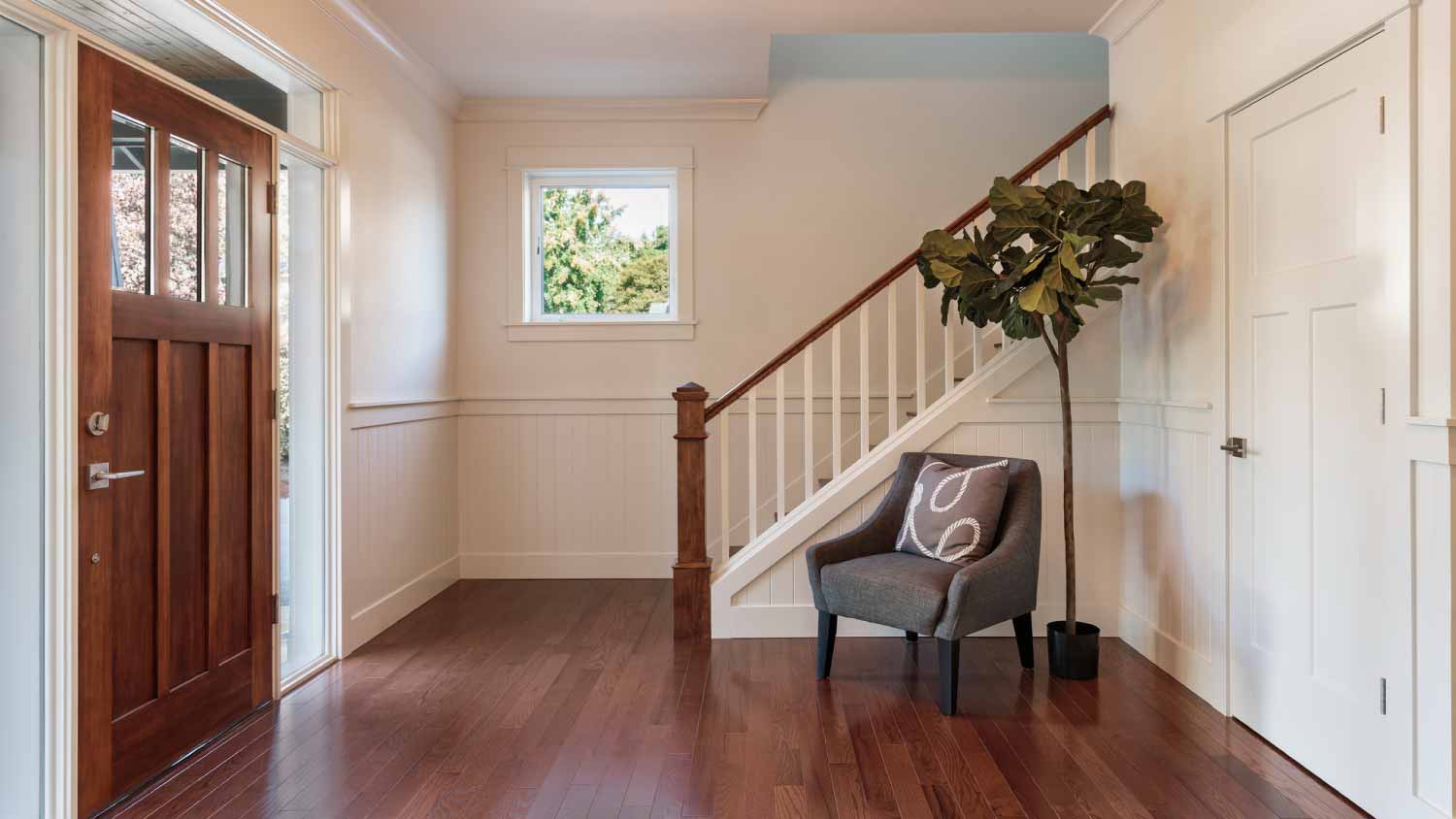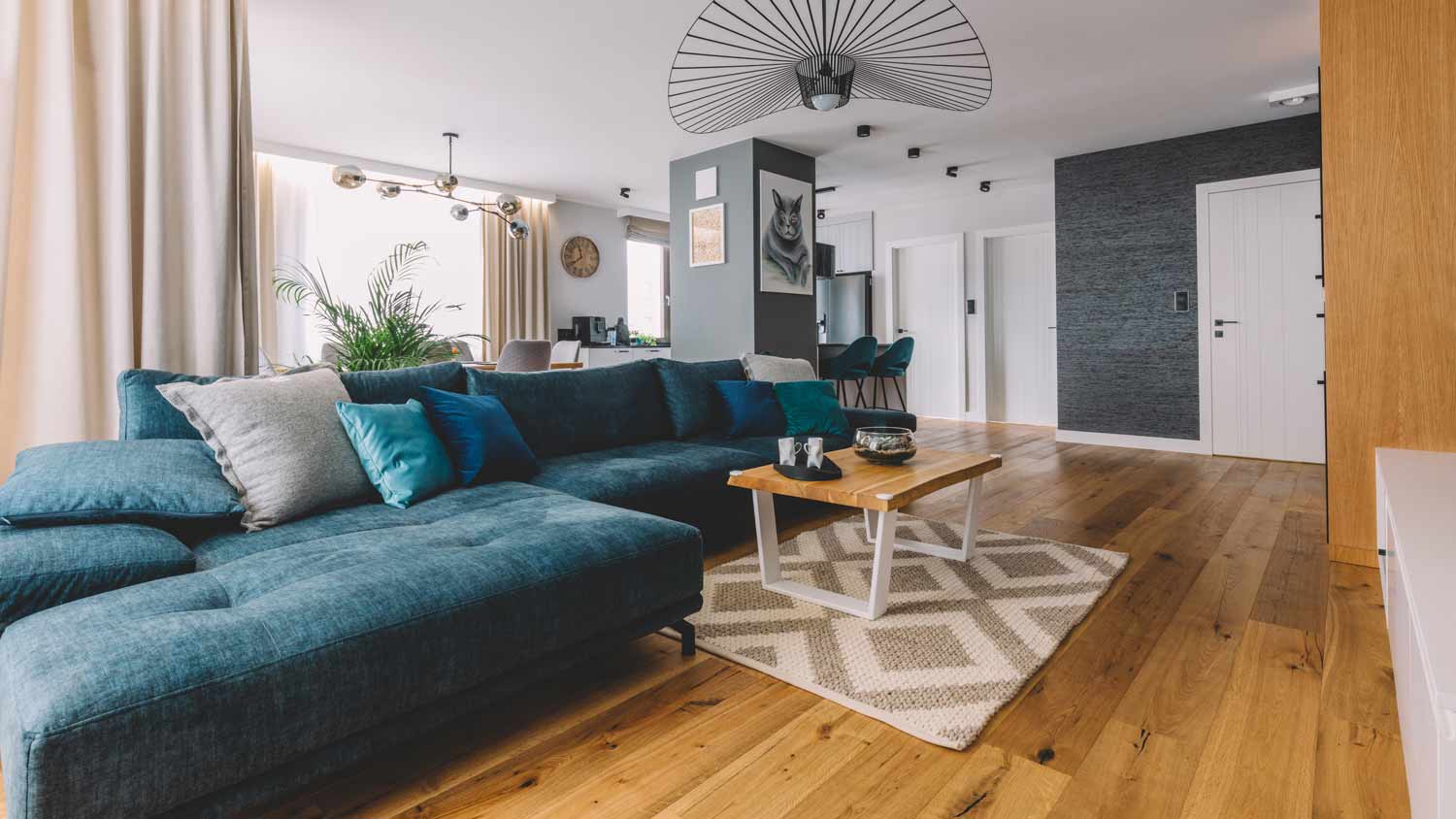What’s the Best Flooring for Kitchens? Explore 10 Top Picks
The right material will leave you floored


Your kitchen floor sees a lot of use day in and day out, from splashes of marinara from your Sunday bolognese to a spill from your toddler’s juice cup. So when you’re planning a kitchen reno, it’s important to consider what type of flooring will stand up best to the wear and tear while still suiting your style and budget. Weigh the pros and cons of 10 of the best types of flooring for kitchens to find the perfect fit for your home.
| Flooring Type | Life Span (Years) |
|---|---|
| Vinyl | 10–25 |
| Laminate | 10–30 |
| Engineered hardwood | 20–30 |
| Solid hardwood | 30–100+ |
| Ceramic tile | 75–100+ |
| Stone tile | 50–100+ |
| Bamboo | 10–30 |
| Cork | 15–40 |
| Brick | 50–100+ |
| Concrete | 20–100+ |
1. Vinyl

Vinyl flooring is made of various layers that add durability and water resistance, and some varieties even include a waterproofing layer for added moisture protection. Vinyl is one of the best flooring options for a kitchen because it can withstand spills, humidity, and heavy traffic, but it still offers the look of more expensive materials, like solid hardwood or stone.
Vinyl flooring costs $2 to $7 per square foot. Some types of vinyl flooring for kitchens, like click-and-lock or peel-and-stick, are easy to install and remove, making them popular with DIYers.
| Pros | Cons |
|---|---|
| Easy to install | Emits VOCs |
| Lower cost | Short life span |
| High durability | Vulnerable to fading |
Best for: Households with kids and pets, DIY installations
2. Laminate
Like vinyl, laminate is an engineered type of flooring made up of several different layers, including a design layer made to look like stone, hardwood, or other materials. The layers are then laminated together, hence the name. When it comes to laminate versus vinyl flooring, some types of vinyl need to adhere to the subfloor with glue, while laminate floors click and lock into place over the existing floor or subfloor. Laminate is not as water-resistant as vinyl, so make sure to clean up any spills as quickly as possible to avoid water damage.
Laminate flooring costs $3 to $13 per square foot, and the click-and-lock configuration makes it easy to install yourself.
| Pros | Cons |
|---|---|
| Low cost | Not waterproof |
| Wide design variety | Requires specific cleaners |
| Easy installation | Less sustainable option |
Best for: Homes with kids, DIY installation
3. Engineered Hardwood
Engineered hardwood is made up of both solid hardwood and plywood, so it offers the look of hardwood but at a lower cost. It isn’t quite as vulnerable to moisture damage or humidity as solid hardwood, but it is just as easy to scratch, dent, or stain. Fortunately, like hardwood, engineered hardwood may give your home’s resale value a boost because of its attractive qualities.
Engineered hardwood flooring costs $4.50 to $16 per square foot, making it a less expensive option compared to solid hardwood.
| Pros | Cons |
|---|---|
| Looks like solid wood | Shows scratches and dents |
| No warping | Not waterproof |
| May boost resale value | Shorter life span than solid wood |
Best for: Lower-traffic kitchens, boosting ROI or resale value
4. Solid Hardwood

Solid hardwood is made entirely from the wood of your choosing, with some popular options including oak, hickory, maple, ash, and walnut. Solid hardwood lends a naturally beautiful look to any kitchen, and if you keep up with regular sealing and refinishing, your hardwood flooring can last decades. But solid hardwood is vulnerable to spills, and scooting bar stools or dining chairs out without floor protectors can lead to scratches.
Hardwood flooring costs $5 to $28 per square foot, with labor making up $3 to $6 per square foot of the cost. It’s best to leave solid hardwood installation to a local flooring company to avoid damaging your beautiful new floors.
| Pros | Cons |
|---|---|
| Attractive | Higher cost |
| Long life span | High maintenance |
| Increases home resale value | Less durable |
Best for: “Forever” homes that you plan to live in for a long time, increasing resale value or ROI
5. Ceramic Tile
Ceramic tile is one of the best flooring types for kitchens for many reasons. Beauty aside, this long-lasting material is something you can install once and enjoy for the rest of your life. Tile is water-resistant, so you won’t have to worry about spills and splashes permanently damaging your investment. Just make sure to keep a good grip on pots and pans while walking on tile since dropping things can crack tile on impact.
Ceramic tile costs $3 to $15 per square foot on average. For more durable and water-resistant glazed ceramic tile, you may pay $4 to $15 per square foot plus labor.
| Pros | Cons |
|---|---|
| Wide variety of designs | Vulnerable to cracking |
| Long-lasting | Difficult to install |
| Water-resistant | Higher cost |
Best for: High-traffic kitchens
6. Stone Tile
Stone tile is synonymous with luxury. Stone is one of the best floorings for kitchens because of its impressive heat resistance and durability. However, stone is a porous material, so it can soak up liquids and stain easily. Sealing stone every few years can help protect it from moisture.
Stone tile costs $5 to $45 per square foot on average, but luxury stone can cost as much as $350 per square foot. Stone can be heavy and difficult to install, so budget for professional installation costs if you want stone tile in your kitchen.
| Pros | Cons |
|---|---|
| Long-lasting | High-maintenance |
| Durable | Not stain-resistant |
| Heat-resistant | Cold and hard underfoot |
Best for: Luxury kitchens
7. Bamboo

Bamboo floors look similar to solid hardwood, but they’re actually made from a hardy grass. Bamboo is an eco-friendly flooring option, perfect for “green” homes. This flooring material is more durable than certain types of hardwood, including oak and cherry. Bamboo floors stand up well to scratching or denting, but they aren’t waterproof. Keep plenty of towels around the kitchen to wipe up spills ASAP.
Bamboo flooring costs $2 to $20 per square foot to install. Consider engineered bamboo flooring for kitchens since engineered varieties are more durable than solid bamboo flooring.
| Pros | Cons |
|---|---|
| Sustainable | Limited design options |
| Durable | Not water-resistant |
| Lower cost | Shorter life span |
Best for: Eco-conscious homes
8. Cork
Cork is made from the bark of cork oak trees, which regenerate bark pretty quickly. That’s why cork joins bamboo in being a sustainable flooring choice for kitchens. There are many pros and cons of cork flooring. It’s a lower-cost flooring option for kitchens and is naturally water-resistant. Plus, cork stays warm, so even walking barefoot in the kitchen in the winter feels comfortable. However, pet claws can easily damage cork, and installing it in a sunny kitchen can cause it to fade.
Cork flooring costs $3 to $11 per square foot, depending on what type you buy. Waterproof cork, a good choice for kitchens, costs $5 to $9 per square foot.
| Pros | Cons |
|---|---|
| Anti-microbial | Limited design options |
| Warm and comfortable underfoot | Not good for homes with pets |
| Water-resistant | Vulnerable to discoloration |
Best for: Eco-conscious homes, homes without pets
9. Brick
You’ve seen brick as a siding option and as accent walls indoors, but did you know brick is a good option for floors, too? For an industrial-chic kitchen, consider adding brick flooring, which is naturally heat- and fire-resistant. You also don’t have to worry about slipping on the rougher material, although it may not be as comfortable to walk on barefoot as other flooring options.
Brick flooring costs $5 to $10 per square foot on average. For a kitchen floor with minimal bumps that you could trip over, leave installation to a pro.
| Pros | Cons |
|---|---|
| Heat- and fire-resistant | Hard underfoot |
| Anti-slip | Vulnerable to staining |
| Highly durable | Limited design options |
Best for: High-traffic kitchens, industrial-inspired designs
10. Concrete

Concrete flooring isn’t just reserved for the garage or backyard patio. This sturdy, long-lasting material can also work well in some kitchens, especially those with a modern or industrial-chic aesthetic. You can customize the look of concrete with stains, stamped patterns, epoxy coating, or other finishes for a unique design. Like stone and brick, concrete’s weakness is moisture. Sealant can help protect against moisture damage and staining. It’s also a heavy material, so save it for kitchens that aren’t above another room, including a basement.
Concrete flooring costs $2 to $16 per square foot to install, and you may pay more to add stains or epoxy coatings.
| Pros | Cons |
|---|---|
| Lower cost | Requires sealing |
| Durable | May lower resale value |
| Customizable look | Less comfortable underfoot |
Best for: Homes without basements, modern or industrial-inspired kitchens

.jpg?impolicy=leadImage)



- 11 Types of Flooring to Consider for Your Home
- 15 Great Options for Budget-Friendly Kitchen Floors
- 6 Options For Improving Your Attic Flooring
- 7 Budget-Friendly Kitchen Flooring Options for Every Style
- 6 Inexpensive Flooring Options That Look Good and Save You Money
- 4 Wood Floors Perfect for Your Kitchen
- The Best Flooring Options for Dogs: A Complete Guide
- 7 Flooring Ideas For Every Style of Sunroom
- Estimate Your Flooring Cost With These Factors
- Bamboo Flooring vs. Hardwood Flooring: Which One Is Right for Your Living Space?










